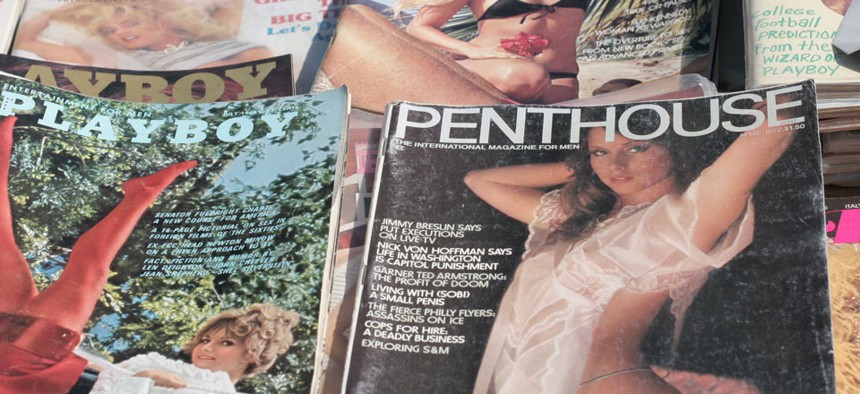
Flickr user Gwen Harlow
Military Services Ditch Racy Magazines
Army and Air Force exchanges pull <em>Playboy</em> and 890 other pubs due to lagging sales.
Adult magazines including Playboy and Penthouse will no longer be sold at Army and Air Force exchanges.
The Army and Air Force Exchange Service announced that it would pull 891 publications from shelves at their facilities because of lackluster sales and to save space for more popular merchandise. The decision, which affects a range of magazines, not just the nude pubs, came about a week after the Pentagon said it did not consider skin mags like Playboy, Penthouse and Nude Magazine “sexually explicit.” That decision sparked criticism from Morality in Media, a faith-based group opposed to porn --and lots of media coverage.
“The decision to no longer stock the material is a business decision driven by time, money, and energy required to facilitate buying habits, combined with decreasing demand,” said Army Lt. Col. Antwan C. Williams, AAFES public affairs chief, in a statement to American Forces Press Service, the Defense Department’s news service. Williams specifically cited as factors the growth of digital publications and slumping sales of hard copies in stores. In addition to Playboy and Penthouse, AAFES also will no longer sell American Curves, Tattoo, The Saturday Evening Post, SpongeBob Comics and Home Buyers Guide, among others.
The removal of the magazines will free up 33 percent more space for other offerings, said Chris Ward, a spokesman for AAFES. The Exchange also is adjusting its other inventory, including giftware, DVDs, video games and music, he said.
While Morality in Media questioned the timing and purported reason for the decision, the group also declared victory in its effort to stop the sale of “sexually exploitative magazines” on many military bases. “Hopefully the other branches will follow suit or Secretary [Chuck] Hagel will order their removal from all bases,” said Dawn Hawkins, executive director of Morality in Media, in a statement.
“No one in DoD has influenced the Exchange’s magazine selection,” Ward said, when asked if AAFES had talked to the Pentagon about its decision.
AAFES runs more than 3,100 facilities around the world, has annual revenue of $9.2 billion and employs 40,662 civilian and military personnel. The Exchange, which ultimately reports to the Army and Air Force leadership, operates several businesses on military installations, including gas stations, convenience stores, restaurants and theaters.
In a July 22 letter to Morality in Media, Defense said it was legal for the department to sell certain nude magazines like Playboy and Penthouse because they were “adult sophisticate” material and not “sexually explicit.” The 1996 Military Honor and Decency Act prohibits the sale or rental of sexually explicit material on Defense property. Title 10, Section 2495b of the U.S. Code defines sexually explicit material as being “an audio recording, a film or video recording, or a periodical with visual depictions, produced in any medium, the dominant theme of which depicts or describes nudity, including sexual or excretory activities or organs, in a lascivious way.”
Morality in Media, led by CEO and President Patrick Trueman, said that response from the Pentagon would be “hilarious if it were not so tragic.”
Iris Somberg, a spokeswoman for Morality in Media, said the group was not seeking to get any more material removed from military shelves. She added that the organization does not believe that looking at nude magazines at the exchanges “causes sexual assault” but “it’s a contributing factor.” The military community has a long-standing problem with sexual harassment and violence within its ranks. The 2012 documentary The Invisible War and several recent allegations of assault and retaliation have prompted calls for reform from many lawmakers and others.
F.E. Vollrath, the Pentagon’s assistant secretary for readiness and force management, said in his July 22 letter to Morality in Media that the department “is committed to providing a safe and healthy environment on our installations for the entire military community.”
Navy Secretary Ray Mabus in June ordered a “comprehensive visual inspection” of all the service’s properties to remove salacious photos and other offensive items from workplaces. Somberg questioned the rationale behind selling magazines like Playboy but banning similar items from the workplace. “It’s a bit hypocritical,” she said.
Defense did not immediately reply to a question about whether the Navy Service Exchange would pull any racy magazines off its shelves in light of the AAFES decision.
(Image via Flickr user Gwen Harlow)







